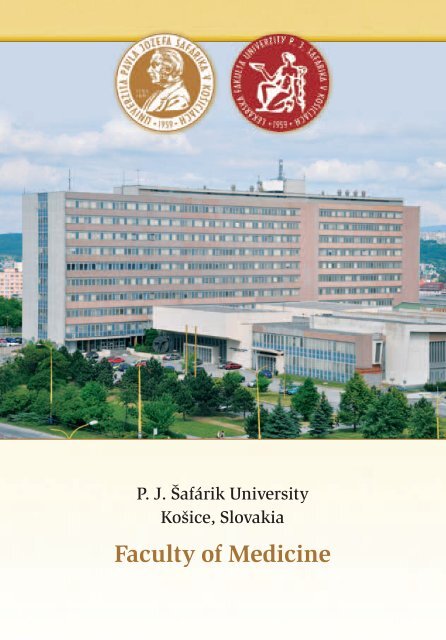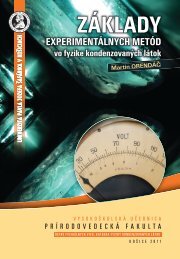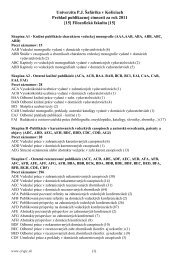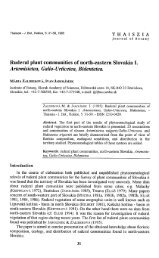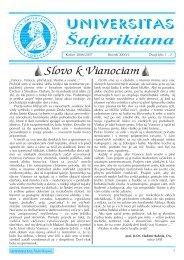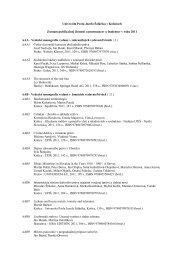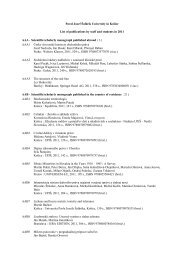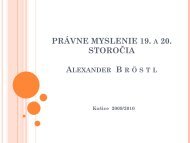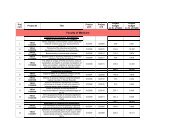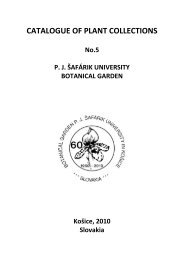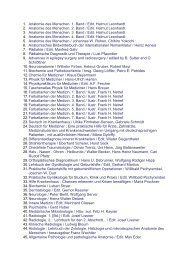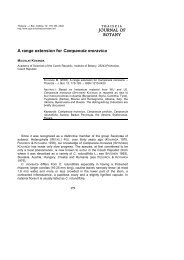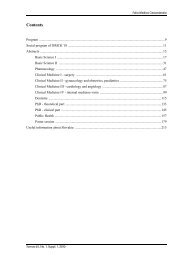Faculty of Medicine - Univerzita Pavla Jozefa Šafárika v Košiciach
Faculty of Medicine - Univerzita Pavla Jozefa Šafárika v Košiciach
Faculty of Medicine - Univerzita Pavla Jozefa Šafárika v Košiciach
Create successful ePaper yourself
Turn your PDF publications into a flip-book with our unique Google optimized e-Paper software.
P. J. Šafárik University<br />
Košice, Slovakia<br />
<strong>Faculty</strong> <strong>of</strong> <strong>Medicine</strong>
P. J. Šafárik University in Košice <strong>Faculty</strong> <strong>of</strong> <strong>Medicine</strong><br />
P. J. Šafárik University<br />
in Košice<br />
<strong>Faculty</strong> <strong>of</strong> <strong>Medicine</strong>
<strong>Faculty</strong> <strong>of</strong> <strong>Medicine</strong><br />
Table <strong>of</strong> Contents<br />
Preface .................................................................................................................. 3<br />
P. J. Šafárik University in Košice ............................................................................. 5<br />
<strong>Faculty</strong> <strong>of</strong> <strong>Medicine</strong> ................................................................................................ 6<br />
Organization <strong>of</strong> Study............................................................................................. 7<br />
Postgraduate Courses ............................................................................................. 9<br />
Specialised Study ................................................................................................... 9<br />
ECTS ..................................................................................................................... 10<br />
Application Procedure ........................................................................................... 11<br />
Health Insurance ................................................................................................... 13<br />
Accommodation .................................................................................................... 13<br />
Research Strategy <strong>of</strong> the <strong>Faculty</strong> ............................................................................ 14<br />
Slovak Medical Students'Association – SloMSA ..................................................... 15<br />
Association <strong>of</strong> the Students <strong>of</strong> <strong>Medicine</strong> in Košice ................................................. 17<br />
Association <strong>of</strong> Dental <strong>Medicine</strong> Students in Košice ................................................ 19<br />
Slovakia ................................................................................................................. 20<br />
Košice the European City <strong>of</strong> Culture ...................................................................... 25<br />
Košice – How to get here ....................................................................................... 29<br />
Important Information .......................................................................................... 31
Preface<br />
Dear young colleagues and friends from<br />
abroad,<br />
We have prepared for you new booklet containing<br />
actual information on everything linked<br />
to <strong>Faculty</strong> <strong>of</strong> <strong>Medicine</strong>, Safarik University in<br />
Košice. <strong>Faculty</strong> <strong>of</strong> <strong>Medicine</strong> in Košice was established<br />
in 1948 thus it belongs to the oldest<br />
and prominent institutions executing activities<br />
– educational (pregradual and postgradual),<br />
scientific (basic and applied research) and others<br />
in the field <strong>of</strong> human medicine in Slovakia.<br />
The most significant role <strong>of</strong> our faculty is to<br />
provide the education for medical pr<strong>of</strong>essions<br />
in the field <strong>of</strong> general medicine and dental medicine.<br />
Along same time our institution prepares<br />
new pr<strong>of</strong>essionals for non-medical health-care<br />
pr<strong>of</strong>essions, e.g. nursing, public health, physiotherapy,<br />
laboratory procedures in health service<br />
and birth assistance.<br />
All the programmes <strong>of</strong> the faculty are being<br />
pursued based on periodically repeated process<br />
<strong>of</strong> the accreditation (once per 6 years) approved<br />
by The Accreditation Committee, an advisory<br />
board <strong>of</strong> Slovak Ministry <strong>of</strong> Education.<br />
In academic year 2008/2009 approximately<br />
2400 students attend the faculty that means<br />
the faculty is the largest one among faculties<br />
<strong>of</strong> Safarik University. All educational activities<br />
are provided by 271 teachers, among them<br />
44 pr<strong>of</strong>essors, 48 associate pr<strong>of</strong>essors,<br />
143 assistant pr<strong>of</strong>essors and 36 lecturers.<br />
Last two years the faculty concentrates its<br />
activity so that it could (might) gather more<br />
students from abroad. We have been succeeded<br />
in increasing the number <strong>of</strong> foreign students by<br />
up to 100 %, from 135 in 2007 to 265 in 2009<br />
and we feel we are prepared to strengthen this<br />
positive process. This means we will be aiming<br />
at further improvement <strong>of</strong> study conditions and<br />
other prerequisites required for study stay, e.g.<br />
together with Safarik University we are in<br />
the process <strong>of</strong> improvement the conditions<br />
in Student Dormitory at Popradska street. This<br />
newly renovated building for up to 100 persons<br />
is equipped with modern furniture, TV, access<br />
to internet, laundry machine etc. so as our<br />
student might feel sufficiently comfortable.<br />
<strong>Faculty</strong> <strong>of</strong> <strong>Medicine</strong><br />
We consider an active partnership to collaborating<br />
institutions in Slovakia and abroad<br />
is very important point in accomplishing longterm<br />
goals set by the Dean Board. The most significant<br />
domestic partners are medical faculties<br />
in Bratislava and Martin, Slovak Academy <strong>of</strong><br />
Sciences, L. P. University Hospital and East Slovak<br />
Institute <strong>of</strong> Cardiovascular Diseases. <strong>Faculty</strong><br />
<strong>of</strong> <strong>Medicine</strong> at Safarik University in Kosice closely<br />
collaborates to institutions abroad, as well. We<br />
pursue collaboration with many medical faculties,<br />
e.g. in Prague, Padova, Lille, Paris, Lodz,<br />
Wroclaw, Krakow, Turku, Kuopio, Malaga, Salamanca,<br />
München, Düsseldorf, Münster, Essen,<br />
Graz, Istanbul, Aydin, Kaunas, Budapest etc.<br />
Dean Board <strong>of</strong> the faculty supports markedly<br />
research activities <strong>of</strong> our students. They<br />
may open regular scientific work under leadership<br />
<strong>of</strong> experienced pr<strong>of</strong>essors <strong>of</strong> our faculty<br />
in preferred scientific fields approved by<br />
the Scientific Board <strong>of</strong> the faculty, like cardiovascular<br />
and respiratory diseases, oncology<br />
diseases and regenerative medicine. Our students<br />
represent the faculty at international<br />
student conferences and annually they acquire<br />
remarkable achievements.<br />
Dear friends, presented introduction is<br />
intended to stimulate you to open the booklet<br />
and find useful information that may help you<br />
to get the proper decision, to come to our faculty<br />
to gain the certificate <strong>of</strong> either medicine doctor<br />
(MUDr., M.D.) or dental doctor (MDDr.) that<br />
is valid throughout the European Community.<br />
Pr<strong>of</strong>.Leonard Siegfried,M.D., PhD.<br />
Dean<br />
3
<strong>Faculty</strong> <strong>of</strong> <strong>Medicine</strong><br />
4<br />
Dean<br />
Pr<strong>of</strong>. Leonard Siegfried, MD, PhD<br />
e-mail: leonard.siegfried@upjs.sk<br />
Pr<strong>of</strong>. Neda Markovská, MD, PhD<br />
Vice-Dean for Study Affairs<br />
e-mail: neda.markovska@upjs.sk<br />
Pr<strong>of</strong>. Darina Kluchová, MD, PhD<br />
Vice-Dean for Study Affairs<br />
e-mail: darina.kluchova@upjs.sk<br />
Pr<strong>of</strong>. Ľudmila Podracká, MD, PhD<br />
Vice-Dean for Study Affairs<br />
e-mail: ludmila.podracka@upjs.sk<br />
Assoc. Pr<strong>of</strong>. Zuzana Gdovinová, MD, PhD<br />
Vice-Dean for International Relations and Presentation <strong>of</strong> the<br />
<strong>Faculty</strong> in Abroad<br />
e-mail: zuzana.gdovinova@upjs.sk<br />
Assoc. Pr<strong>of</strong>. Ján Sabo, RNDr., PhD<br />
Vice-Dean for Scientific and Research Activities<br />
e-mail: jan.sabo@upjs.sk<br />
MVDr. Ján Rosocha, PhD<br />
Vice-Dean for Projects Grant<br />
e-mail: jan.rosocha@upjs.sk<br />
Assoc. Pr<strong>of</strong>. Pavol Jarčuška, MD, PhD<br />
Vice-Dean for the Development <strong>of</strong> the <strong>Faculty</strong><br />
e-mail: pavol.jarcuska@upjs.sk
P. J. Šafárik University<br />
in Košice<br />
In the year 1657, Košice became the seat<br />
<strong>of</strong> a university – Academia Cassoviensis<br />
– situated at that time in the most distant<br />
part <strong>of</strong> Eastern Europe. The University was<br />
founded by the Bishop <strong>of</strong> Eger, Benedictus<br />
Kischdy. The Founding Charter, the <strong>of</strong>ficial<br />
document <strong>of</strong> setting up the University,<br />
remains a very significant record, a pro<strong>of</strong><br />
<strong>of</strong> that major historical event.<br />
In 1660, Leopold I, the Hungarian King<br />
and Roman Emperor, issued the mandate<br />
<strong>of</strong> the Golden Bull, granting the University<br />
privileges similar to those <strong>of</strong> the well-known<br />
European universities <strong>of</strong> Vienna, Prague,<br />
Cologne, and some others.<br />
The University originally consisted<br />
<strong>of</strong> the Faculties <strong>of</strong> Theology, Philosophy,<br />
and Philology, having been joined later by<br />
the <strong>Faculty</strong> <strong>of</strong> Law. The publishing house<br />
was an integral part <strong>of</strong> the University. The<br />
University turned into the Royal Academy<br />
in the year 1776 and still later, only the <strong>Faculty</strong><br />
<strong>of</strong> Law retained the character <strong>of</strong> college.<br />
The Jesuite University Church was built<br />
in the years between 1671<br />
and 1684 for the University.<br />
The Law Academy<br />
became the institution's<br />
<strong>of</strong>ficial name in the year<br />
1850 (until its dissolution<br />
in 1921). The existence <strong>of</strong><br />
the University in Košice<br />
was suspended between<br />
the years 1921 and 1948.<br />
The foundation <strong>of</strong> Pavol<br />
Jozef Šafárik University<br />
in the year 1959 meant<br />
a milestone in the development<br />
education and<br />
research at the school.<br />
The university tradition<br />
<strong>Faculty</strong> <strong>of</strong> <strong>Medicine</strong><br />
in Košice, which had been suspended for<br />
38 years, was thus re-established.<br />
P. J. Šafárik University is named after<br />
the outstanding personality in the Slovak<br />
history – Pavol Jozef Šafárik (1795 – 1861),<br />
a scientist, poet, linguist, ethnographer,<br />
archaeologist, and educator. His idea <strong>of</strong><br />
brotherhood among all Slavonic and European<br />
nations is a recurring theme throughout<br />
his extensive work.<br />
At the beginning, the University consisted<br />
<strong>of</strong> two faculties: the <strong>Faculty</strong> <strong>of</strong> Philosophy<br />
and the <strong>Faculty</strong> <strong>of</strong> <strong>Medicine</strong>, the latter<br />
being older.<br />
Today, the University consists<br />
<strong>of</strong> five faculties:<br />
• <strong>Faculty</strong> <strong>of</strong> <strong>Medicine</strong> • <strong>Faculty</strong> <strong>of</strong> Law<br />
• <strong>Faculty</strong> <strong>of</strong> Science • <strong>Faculty</strong> <strong>of</strong> Arts<br />
• <strong>Faculty</strong> <strong>of</strong> Public Administration<br />
ADDRESS<br />
<strong>Univerzita</strong> P. J. Šafárika v Košiciach<br />
Šrobárova 2, 041 80 Košice,<br />
Slovak Republic<br />
Homepage: http://www.upjs.sk<br />
E-mail address: rektor@kosice.upjs.sk<br />
Telephone: ++421/55/622 26 08<br />
Fax: ++421/55/678 69 59<br />
5
P. J. Šafárik University in Košice<br />
6<br />
The <strong>Faculty</strong> <strong>of</strong> <strong>Medicine</strong><br />
The <strong>Faculty</strong> <strong>of</strong> <strong>Medicine</strong> was founded<br />
in the year 1948 as a branch <strong>of</strong> the <strong>Faculty</strong><br />
<strong>of</strong> <strong>Medicine</strong> <strong>of</strong> the Slovak University, later<br />
Comenius University in Bratislava. In the<br />
year 1959 the <strong>Faculty</strong> <strong>of</strong> <strong>Medicine</strong> and the<br />
Philosophical <strong>Faculty</strong> acceded, and a new<br />
university in East Slovakia, Pavol Jozef<br />
Šafárik University, was established.<br />
The origin <strong>of</strong> the <strong>Faculty</strong> <strong>of</strong> <strong>Medicine</strong><br />
bears relation with the State Hospital in<br />
Košice, having been <strong>of</strong>ficially opened on<br />
24th June 1924. Later on, a new modern<br />
complex <strong>of</strong> the <strong>Faculty</strong> <strong>of</strong> <strong>Medicine</strong> and<br />
the Teaching Hospital were built. The new<br />
twenty-storey building <strong>of</strong> the Teaching<br />
Hospital was opened at the beginning<br />
<strong>of</strong> the year 1981. This is now a huge hospital<br />
complex <strong>of</strong> 1 616 beds. The new twelve-storey<br />
building <strong>of</strong> theoretical departments was<br />
opened at the beginning <strong>of</strong> the academic<br />
year 1984/1985 and is an integral part <strong>of</strong><br />
the main <strong>Faculty</strong> site.<br />
Nowadays, both <strong>of</strong> the above mentioned<br />
hospitals serve the purpose <strong>of</strong> providing<br />
practical training for medical students. The<br />
<strong>Faculty</strong> <strong>of</strong> <strong>Medicine</strong> has significant partners<br />
– six other medical facilities, where the <strong>Faculty</strong><br />
<strong>of</strong>fers its students their field training.<br />
The faculty consists <strong>of</strong> 57 institutes and<br />
departments carrying out their pr<strong>of</strong>essional<br />
performance. There are 40 pr<strong>of</strong>essors,<br />
45 associate pr<strong>of</strong>essors, 144 senior lecturers,<br />
2041 Slovak students and 250 international<br />
students at the <strong>Faculty</strong> in the academic year<br />
2008/2009.
Organization <strong>of</strong> the study<br />
The <strong>Faculty</strong> <strong>of</strong> <strong>Medicine</strong> educates physicians<br />
and surgeons in the field <strong>of</strong> general<br />
medicine capable <strong>of</strong> rendering pr<strong>of</strong>essional<br />
medical treatment and care, focusing on<br />
preventive aspects <strong>of</strong> medicine. Vocational<br />
training is based on the application <strong>of</strong> the<br />
latest knowledge in medical science and<br />
students are also <strong>of</strong>fered a possibility <strong>of</strong><br />
acquring a background for their research<br />
activity. The study <strong>of</strong> foreign languages and<br />
moral ethical aspects <strong>of</strong> the pr<strong>of</strong>ession are<br />
included in the study in the spirit <strong>of</strong> the<br />
Hippocrite oath. Students acquire specialized<br />
knowledge in theoretical, pre-clinical<br />
and clinical subjects through lectures, seminars,<br />
clerkships, specialised field training,<br />
and consultations.<br />
<strong>Faculty</strong> <strong>of</strong> <strong>Medicine</strong><br />
The applicants may enroll for the fulltime<br />
study in the following doctoral studies<br />
(eiher in the English language or the Slovak<br />
language):<br />
• General <strong>Medicine</strong> – the graduates are<br />
awarded the degree <strong>of</strong> “Doctor <strong>of</strong> General<br />
<strong>Medicine</strong>” (MUDr., the equivalent <strong>of</strong> MD)<br />
after a six-year study (12 semesters),<br />
• Dental <strong>Medicine</strong> – the graduates are<br />
awarded the degree <strong>of</strong> “Doctor <strong>of</strong> Dental<br />
<strong>Medicine</strong>” (MDDr., the equivalent <strong>of</strong> DMD)<br />
after a six-year study (12 semesters).<br />
The study at the <strong>Faculty</strong> <strong>of</strong> <strong>Medicine</strong>,<br />
Šafárik University, is completed by passing<br />
the final state examinations and defending<br />
the degree thesis.There is possibility to continue<br />
in postgraduate study or specialisation<br />
study after completing the pregradual<br />
study.<br />
7
<strong>Faculty</strong> <strong>of</strong> <strong>Medicine</strong><br />
8
After completing the first cycle <strong>of</strong> study,<br />
one may proceed by enrolling for the postgraduate<br />
study or specialised study.<br />
Postgraduate courses (in the Slovak language)<br />
may be taken in the following: Clinical<br />
Biochemistry, Normal and Pathological<br />
Physiology, Internal <strong>Medicine</strong>, Epidemiology,<br />
Hygiene, Microbiology, Surgery, Pediatrics,<br />
Psychiatry, Otorhinolaryngology,<br />
Pharmacology, Dental <strong>Medicine</strong>, Clinical<br />
Pharmacology, Pathological Anatomy and<br />
Forensic <strong>Medicine</strong>, Neurosciences, Gynaecology<br />
and Obstetrics, Anatomy, Histology,<br />
and Embryology. Students are awarded the<br />
degree <strong>of</strong> PhD (Philosophiae Doctor).<br />
Specialised study (in the Slovak language)<br />
is organised in the following medical<br />
subspecialities: Dental <strong>Medicine</strong>, Der-<br />
<strong>Faculty</strong> <strong>of</strong> <strong>Medicine</strong><br />
9
<strong>Faculty</strong> <strong>of</strong> <strong>Medicine</strong><br />
matology, Diabetology, Endocrinology, General<br />
<strong>Medicine</strong>, Gynaecology and Obstetrics,<br />
Haematology and Transfusiology, Infectology,<br />
Internal <strong>Medicine</strong>, Maxill<strong>of</strong>acial Surgery,<br />
Neurology, Neurosurgery, Paediatrics,<br />
Pneumology and Phtiseology, Occupational<br />
<strong>Medicine</strong>, Otorhinolaryngology, Radiology,<br />
Surgery, Gastroenterological Surgery,<br />
Traumatology, Urology, Vascular Surgery,<br />
Anaesthesiology (for nurses).<br />
The study usually lasts for 3 up to 6.5 years.<br />
During their training, the doctors attain both<br />
skills and knowledge making them eligible<br />
for the performance <strong>of</strong> clinical practise.<br />
ECTS, the European Credit Transfer<br />
System, is employed and provides for the<br />
curriculum transparency. The ECTS study<br />
programme has to be approved by both,<br />
national and host academic institutions<br />
before the students leave for their study<br />
sojourn abroad.<br />
10
The main principles <strong>of</strong> the credit-based<br />
study system at the <strong>Faculty</strong> <strong>of</strong> <strong>Medicine</strong>,<br />
Šafárik University, are as follows:<br />
• The <strong>Faculty</strong> <strong>of</strong> <strong>Medicine</strong> will retain its<br />
present study programme classification into<br />
levels, corresponding to the academic years.<br />
The students are allowed to proceed into the<br />
next academic year by successfully passing<br />
all <strong>of</strong> the examinations and other assessment<br />
activities required.<br />
• Medical study requires the compliance<br />
with further education on both horizontal<br />
and vertical levels.<br />
• 60 credits represent one year <strong>of</strong> study<br />
(in terms <strong>of</strong> workload) and 360 credits are<br />
required for completing the study at the <strong>Faculty</strong><br />
<strong>of</strong> <strong>Medicine</strong>, Šafárik University.<br />
• The content <strong>of</strong> the compulsory medical<br />
curriculum will not be changed.<br />
• The <strong>Faculty</strong> will assign the students<br />
a higher number <strong>of</strong> regular achievement<br />
<strong>Faculty</strong> <strong>of</strong> <strong>Medicine</strong><br />
tests during the respective semesters <strong>of</strong> their<br />
study.<br />
Study in the English language is intended<br />
for the students who want to graduate<br />
from this <strong>Faculty</strong> or for the ERASMUS students.<br />
Application Procedure<br />
The applicants wishing to acquire a degree<br />
in General <strong>Medicine</strong> or Dental <strong>Medicine</strong><br />
at the <strong>Faculty</strong> <strong>of</strong> <strong>Medicine</strong>, Šafárik University<br />
in Košice, are required to have their<br />
secondary education completed.<br />
The applicants must successfully pass<br />
their admittance tests in Chemistry and<br />
Biology. Since the language <strong>of</strong> instruction<br />
is English, applicants should posses good<br />
command <strong>of</strong> English.<br />
11
<strong>Faculty</strong> <strong>of</strong> <strong>Medicine</strong><br />
Deadlines<br />
Application forms should be filed by the<br />
end <strong>of</strong> March for entrance examination in<br />
April and May and by the end <strong>of</strong> May for<br />
the entrance examination in June and August.<br />
Documents to be submitted<br />
The applicants are required to file the following<br />
docuemnts as originals or notarised<br />
copies:<br />
1. Application form<br />
2. Official copy <strong>of</strong> the secondary school<br />
certificate alongside with its <strong>of</strong>ficial<br />
translation into the English/Slovak<br />
languages.<br />
3. Curriculum vitae in English<br />
4. Health certificate in English<br />
5. Photocopy <strong>of</strong> the passport<br />
6. Three passport-size photographs<br />
7. Official copy <strong>of</strong> the birth certificate,<br />
if available.<br />
12<br />
The documents as listed above are to be<br />
submitted to the following address:<br />
Pavol Jozef Šafárik University in Košice,<br />
<strong>Faculty</strong> <strong>of</strong> <strong>Medicine</strong>, Department <strong>of</strong> Study<br />
Trieda SNP 1, 040 11 Košice<br />
the Slovak Republic<br />
More information at: www.upjs.sk, than<br />
<strong>Faculty</strong> <strong>of</strong> <strong>Medicine</strong>.<br />
Tuition fee is calculated under<br />
the University Regulations (available at<br />
www.upjs.sk).<br />
Residence Permit<br />
Students coming from the EU or the EEA<br />
countries do not need student visa, but<br />
have to apply for a residence permit within<br />
90 days after their arrival to Slovakia.<br />
Students coming from other countries<br />
need student visa, which they may obtain<br />
at any Embassy or Consulaar Office <strong>of</strong> the<br />
Slovak Republic.
The address <strong>of</strong> the Immigration Office<br />
(police department for international<br />
visitors' affairs) is:<br />
Oddelenie cudzineckej a pasovej služby<br />
KR PZ Košice, Trieda SNP 35<br />
040 11 Košice, the Slovak Republic<br />
Phone No. +421/55/9619 31 208<br />
Health Insurance<br />
Students should arrange their health insurance<br />
for the time <strong>of</strong> their study in the Slovak<br />
Republic. Payment is required for any<br />
medical treatment. Students coming from<br />
the EU countries should have their insurance<br />
policy valid for Slovakia.<br />
Such insurance policy may also be<br />
obtained in Slovakia.<br />
Accommodation<br />
Accommodation is arranged in the dormitory<br />
at Popradská St. No. 76.<br />
Fee:<br />
• 1 bed/ 1 person/ month 123 EUR<br />
• 2 bed/ 2 persons/ month 93 EUR<br />
• 2 bed/ 1 person/ month 186 EUR<br />
• 3 bed/ 3 person/ month 86 EUR<br />
• 3 bed/ 1 person/ month 259 EUR<br />
The study <strong>of</strong> ERASMUS students<br />
is based on the signed bilateral agreements.<br />
You may find any relevant information<br />
at www.upjs.sk, international relations.<br />
<strong>Faculty</strong> <strong>of</strong> <strong>Medicine</strong><br />
Before you arrive. After you have been<br />
accepted as an LLP/Erasmus student by<br />
this University, please get in touch with our<br />
IRO (the University International Relations<br />
Office).<br />
Arrange your travel ticket, health insurance,<br />
prepare all the documents required<br />
for your stay in Slovakia (passport, visa – for<br />
non-EU countries, permission for a temporary<br />
residence in Slovakia, if required). For<br />
more information contact our IRO or the<br />
nearest Embassy <strong>of</strong> the Slovak Republic.<br />
If you wish to take a course in the Slovak<br />
language, we will try and arrange one for<br />
you (this usually depends on the number<br />
<strong>of</strong> students interested). Inform the IRO<br />
<strong>of</strong> the exact date <strong>of</strong> your arrival.<br />
First Days. Once in Košice, please visit<br />
our IRO to get your information package on<br />
this University. We will arrange the inssuance<br />
<strong>of</strong> your Student Card and an e-mail address<br />
for you and will help you contact and<br />
meet with your Department LLP/Erasmus<br />
Coordinator.<br />
Once required to appear at the International<br />
Visitors' Police Department to register<br />
your sojourn in Slovakia or make your<br />
documents dossier complete, the international<br />
relations <strong>of</strong>ficer will be pleased to<br />
escort you on your first visit there.<br />
During your stay. You are welcome to<br />
appear in person with the International Relations<br />
Office during their opening hours<br />
(Mon – Fri 8:00 a.m. – 3:00 p.m.) or by appointment<br />
arranged by e-mail. We will do<br />
our best in assisting you in any matters pertaining<br />
to your stay at this University. Your<br />
Department Coordinator will only be happy<br />
to be <strong>of</strong> assistance to you in settling your<br />
academic issues.<br />
Please feel free to contact the <strong>Faculty</strong><br />
Department <strong>of</strong> International Relations any<br />
time.<br />
13
<strong>Faculty</strong> <strong>of</strong> <strong>Medicine</strong><br />
14<br />
ADDRESS<br />
<strong>Faculty</strong> <strong>of</strong> <strong>Medicine</strong><br />
P. J. Šafárik University<br />
Trieda SNP 1, 040 11 Košice<br />
Slovak Republic<br />
Homepage:<br />
http://www.upjs.sk/en/faculty-<strong>of</strong>-medicine/<br />
E-mail address:<br />
beata.moskova@upjs.sk<br />
(for foreign students)<br />
Telephone: ++421/55/640 46 03<br />
Fax: ++421/55/789 49 29<br />
kvetoslava.matasovska@upjs.sk<br />
(for ERASMUS students)<br />
Telephone: ++421/55/640 46 13<br />
Fax: ++421/55/642 81 51<br />
++421/55/642 02 53<br />
Dormitory<br />
Research Strategy <strong>of</strong> the <strong>Faculty</strong><br />
Research strategy <strong>of</strong> the <strong>Faculty</strong> <strong>of</strong> <strong>Medicine</strong><br />
is focused on the following key research<br />
areas:<br />
– Oncology<br />
– Cardiology, Respirology,<br />
andMetabolism<br />
– Regenerative <strong>Medicine</strong><br />
In our opinion, the future <strong>of</strong> research lies<br />
in breaking down some <strong>of</strong> the traditional<br />
barriers among academic disciplines.<br />
The <strong>Faculty</strong> <strong>of</strong> <strong>Medicine</strong> aims at becoming<br />
a successful research institution,<br />
including the quality <strong>of</strong> research outputs,<br />
international recognition and collaboration,<br />
and performance relative to peer institutions.
To achieve these aims, our measures are<br />
built on the development <strong>of</strong>:<br />
– research Centres <strong>of</strong> Excellence<br />
for Oncology, Cardiology, Respirology<br />
and Metabolism;<br />
– central research laboratories <strong>of</strong> the<br />
<strong>Faculty</strong> for genomics, proteomics,<br />
morphology, flow cytometry and<br />
biomodulatory medicine;<br />
– research activities <strong>of</strong> both pre-graduate<br />
and post-graduate students;<br />
– issuance <strong>of</strong> research journals Folia<br />
Medica Cassoviensia, Transactions <strong>of</strong> the<br />
Universities <strong>of</strong> Košice, Biomedical sub-edition<br />
and Arteriosclerosis.<br />
The <strong>Faculty</strong>'s research strengths are<br />
growing rapidly. Both staff and students <strong>of</strong><br />
the <strong>Faculty</strong> published about 65 full scientific<br />
papers in impact journals during the last<br />
academic year and about 700 ISI citations<br />
per annum have been noted. Over 150 pregraduate<br />
students are involved in the student<br />
research work at the <strong>Faculty</strong>. Students<br />
<strong>of</strong> the <strong>Faculty</strong> have been awarded quite<br />
a number <strong>of</strong> honours at European Students'<br />
Conferences in recent years.<br />
<strong>Faculty</strong> <strong>of</strong> <strong>Medicine</strong><br />
Students's associations<br />
SloMSA<br />
(Slovak Medical Students' Association)<br />
SloMSA is a non-pr<strong>of</strong>it and non-governmental<br />
organisation with a potential outreach<br />
to medical students all over Slovakia.<br />
Since 1993, SloMSA has existed as a voluntary<br />
organisation with the overall objective<br />
<strong>of</strong> improving public health in Slovakia and<br />
serving as a forum for sharing ideas and<br />
expertise among medical student organisations.<br />
SloMSA is a national organisation with<br />
the motto to act locally through its member<br />
organisations. Our activities include commencing<br />
and running projects within the<br />
fields <strong>of</strong> public health, sustainable development,<br />
medical education, reproductive<br />
health, medical ethics, peace, and health<br />
care for refugees, children, and other disadvantaged<br />
people.<br />
SloMSA has three member organisations,<br />
the medical students' associations in<br />
Bratislava, Martin, and Košice.<br />
SloMSA became a member <strong>of</strong> the International<br />
Federation <strong>of</strong> Medical Students'<br />
Associations (IFMSA) in the year 1993.<br />
IFMSA is a non-pr<strong>of</strong>it, UN-recognised non-<br />
-governmental organisation with membership<br />
in 105 countries and a potential outreach<br />
<strong>of</strong> over 900,000 medical students<br />
worldwide.<br />
SloMSA's vision is to motivate future<br />
medical pr<strong>of</strong>essionals to work for the improvement<br />
<strong>of</strong> health in Slovakia and worldwide.<br />
15
<strong>Faculty</strong> <strong>of</strong> <strong>Medicine</strong><br />
SloMSA consists <strong>of</strong> 5 Standing Committees:<br />
• Standing Committee<br />
on Pr<strong>of</strong>essional Exchange (SCOPE)<br />
• Standing Committee<br />
on Research Exchange (SCORE)<br />
• Standing Committee<br />
on Medical Education (SCOME)<br />
• Standing Committee<br />
on Public Health (SCOPH)<br />
• Committee on Reproductive Health<br />
including AIDS (SCORA)<br />
Standing Committee<br />
on Pr<strong>of</strong>essional Exchange<br />
(SCOPE)<br />
The Slovak National Exchange Committee<br />
deals with the exchange <strong>of</strong> medical students<br />
at both pre-clinical and clinical levels<br />
(clerkships) between SloMSA and other<br />
countries, members <strong>of</strong> IFMSA.<br />
The aim <strong>of</strong> SCOPE is to promote international<br />
understanding and cooperation<br />
among medical students and all health pr<strong>of</strong>essionals<br />
through international exchange <strong>of</strong><br />
students. The Exchange program <strong>of</strong>fers students<br />
unique educational and cultural experience<br />
in addition to their regular medical<br />
curriculum. It serves the goal <strong>of</strong> broadening<br />
the students' understanding <strong>of</strong> medical and<br />
social conditions in different countries.<br />
Pr<strong>of</strong>essional Exchange can either be preclinical<br />
or clinical. The clerkship is purely<br />
educational for the student, who will not receive<br />
any payment.<br />
• Pre-Clinical Clerkship is intended for<br />
exchange students working or studying at<br />
pre-clinical departments <strong>of</strong> a medical faculty,<br />
school or hospital.<br />
• Clinical Clerkship is intended for exchange<br />
students in clinical departments <strong>of</strong><br />
a hospital or a clinic, or attached to a general<br />
practitioner.<br />
16<br />
• Nurses field training gives the opportunity<br />
to master basic skills and the system<br />
<strong>of</strong> work in hospitals. The student is under<br />
supervision <strong>of</strong> a doctor, while being at the<br />
same time involved in the work <strong>of</strong> nurses.<br />
This type <strong>of</strong> clerkship is highly recommended<br />
for pre-clinical students and is available<br />
at the Local Committee (LC) in Košice.<br />
Standing Committee<br />
on Research Exchange (SCORE)<br />
The Research Exchange Programme enables<br />
medical students to participate in international<br />
research projects. The Research<br />
Project is specifically defined by its tutor and<br />
listed in the catalogue <strong>of</strong> research projects<br />
<strong>of</strong> the participating country.<br />
The student becomes a member <strong>of</strong><br />
the research team and carries out the research<br />
work under the supervision <strong>of</strong> their<br />
tutor. The student will be guided through<br />
the basic principles <strong>of</strong> the research, such<br />
as literature studies, collecting information,<br />
scientific writing, laboratory work, statistics<br />
and ethical aspects. Usually the projects last<br />
from 4 weeks to 3 months and can be carried<br />
out in English or in the language <strong>of</strong> the<br />
host country.<br />
Slovak Medical Student's<br />
Association<br />
The main aim <strong>of</strong> our SloMSA Exchange<br />
Team is to promote Slovakia abroad and improve<br />
the quality <strong>of</strong> services provided for<br />
foreign exchange students.<br />
• We <strong>of</strong>fer an excellent social programme<br />
during your stay in Slovakia, which comprises<br />
travelling all over our country (mountains,<br />
castles, caves, wooden churches...).<br />
Of course, a feel <strong>of</strong> the Slovak nightlife is<br />
included.<br />
Contact: SloMSA www.slomsa.sk<br />
IFMSA www.ifmsa.org
Spolok medikov mesta Košice (SMMK)<br />
(Association <strong>of</strong> the Students<br />
<strong>of</strong> <strong>Medicine</strong> in Košice)<br />
SMMK is one <strong>of</strong> the 3 Local<br />
Committees <strong>of</strong> SloMSA.<br />
Who can become a member <strong>of</strong> SMMK?<br />
Anybody interested!<br />
And what do we do?<br />
Club <strong>of</strong> the Students <strong>of</strong> Dentistry<br />
The club was created to teach oral hygiene<br />
at high schools and to organise ceilidh<br />
and other projects in the dental field. We are<br />
currently helping with “the day for health”,<br />
an event aimed at informing the public <strong>of</strong><br />
the importance <strong>of</strong> oral hygiene.<br />
Activities:<br />
• project DENTAL ALARM<br />
���teach children in kindergartens<br />
and schools how to brush their teeth<br />
• lectures on oral health for children<br />
and adults<br />
Club <strong>of</strong> the journal<br />
“Ad Manus Medici”<br />
The main aim <strong>of</strong> this club is to produce<br />
the “Ad Manus Medici” journal, which<br />
comes out twice a year. It covers all the activities<br />
<strong>of</strong> the SMMK.<br />
Activities:<br />
• serialize 1 – 2 times per year the journal<br />
for medical students,<br />
• news about school, interesting articles<br />
on medicine, many pieces <strong>of</strong> useful<br />
advice for exams and advice where<br />
<strong>Faculty</strong> <strong>of</strong> <strong>Medicine</strong><br />
to go and what to do next couple <strong>of</strong><br />
the months,<br />
• there is also an internet version on our<br />
website – www.smmk-online.sk.<br />
Club dedicated to children<br />
The club organises thematic days to entertain<br />
children in the hospital and creche's.<br />
It also organises fund raisers and ceilidhs.<br />
The club organises various thematic days<br />
(Santa, Witches, etc.) cooperating actively<br />
in project – the link <strong>of</strong> kids' trust and organising<br />
summer camps for kids with oncological<br />
deseases.<br />
Activities:<br />
• carnival for children in the hospital<br />
and foster homes,<br />
• camp for children with oncological<br />
diagnosis,<br />
• everyday activities for children in the<br />
hospital,<br />
• Day <strong>of</strong> Daffodils,<br />
• Teddy Bear Hospital.<br />
Club <strong>of</strong> Advertising<br />
and the Internet<br />
This club is in charge <strong>of</strong> the maintenance<br />
and news on the SMMK web site in cooperation<br />
with other clubs.<br />
Activities:<br />
• Website <strong>of</strong> SMMK<br />
– www.smmk-online.sk<br />
• Forum for medical students<br />
• Promotial materials <strong>of</strong> our LC<br />
Club <strong>of</strong> Leisure<br />
The Clus <strong>of</strong> Leisure organises sporting<br />
and social events, such as the Autumn<br />
Immatriculation Ball and the Spring Party.<br />
Activities:<br />
• Autumn Immatriculation Ball<br />
• Spring Party<br />
17
<strong>Faculty</strong> <strong>of</strong> <strong>Medicine</strong><br />
18<br />
Club <strong>of</strong> the Public Health<br />
The club <strong>of</strong> Public Health works together<br />
with other clubs on fund raisers, such as the<br />
Day <strong>of</strong> Lillies, White Crayon, Teddy Bear<br />
Hospital. Day for Health is the latest and the<br />
only one <strong>of</strong> its kind in Slovakia. The club is<br />
preparing other projects, such as first aid<br />
courses at high schools and Smile X. The<br />
club also cooperates with the Slovak Red<br />
Cross.<br />
Activities:<br />
• Project: Day for Health<br />
• Peer program (AIDS)<br />
• World Day Against AIDS<br />
Club <strong>of</strong> International Activities<br />
The club organises one month international<br />
exchange clerkships both for students<br />
from the LF UPJS wishing to have<br />
a clerkship abroad, as well as international<br />
students wishing to have an internship<br />
at the LF UPJS.<br />
Activities:<br />
• Clerkships for medical students to<br />
countries all around the world<br />
• Exchange programme for incomings students<br />
to Kosice<br />
• Project:<br />
Get to know Slovakia<br />
��Trip to mountains, countryside, sightseeing,<br />
parties and many more…<br />
Get to know students from abroad<br />
Feel free to contact us �<br />
Hope to meet you soon!<br />
Contact:<br />
LF UPJŠ,<br />
Spolok medikov mesta Košice (SMMK)<br />
Trieda SNP 1, 040 11 Košice, Slovakia<br />
Website: www.smmk-online.sk<br />
E-mail: smmk@smmk-online.sk
Spolok študentov zubného lekárstva<br />
v Košiciach (SŠZLK)<br />
Association <strong>of</strong> Dental <strong>Medicine</strong> Students<br />
in Košice (ADSK),<br />
After the name <strong>of</strong> field <strong>of</strong> study “Stomatology”<br />
has changed, by forming ADSK we<br />
have replaced the Association <strong>of</strong> students <strong>of</strong><br />
stomatology. With this new name, it is active<br />
since 2008.<br />
SŠZLK (ADSK) associates students <strong>of</strong><br />
Dental medicine in Košice at our University.<br />
We are a group <strong>of</strong> cheerful, ambitious<br />
and open-minded young people whose<br />
common goal is the dentistry and improving<br />
the quality <strong>of</strong> our studies. We are European<br />
Dental Students Association (EDSA)<br />
and International Association <strong>of</strong> Dental Students<br />
(IADS) members. Everybody joining<br />
us can pr<strong>of</strong>it from plenty <strong>of</strong> activities these<br />
two associations and we provide, including<br />
international cooperation, projects and exchanges.<br />
We cooperate with SMMK.<br />
Our members participate in local and<br />
national projects:<br />
• CURAPROX DENTAL ALARM<br />
• Day for Health in cooperation with<br />
SMMK<br />
• Program <strong>of</strong> prevention at primary<br />
schools in Košice and surrounding<br />
areas.<br />
• Dental care for kinds patients at<br />
the department <strong>of</strong> oncology, carcinology<br />
<strong>Faculty</strong> <strong>of</strong> <strong>Medicine</strong><br />
• Trips and free time activities for<br />
the students <strong>of</strong> dentistry – „DentAll<br />
Danišovce“<br />
• To inform members <strong>of</strong> our „Big-Small“<br />
community about conferences, work<br />
shops, international exhibitions<br />
(directly or otherwise connected<br />
to dentistry)<br />
• Help you with all the things you might<br />
need to know when studying at our<br />
University<br />
We also plan to realize many more projects,<br />
so come and join us and help us making<br />
studying <strong>of</strong> the Dentistry in Košice better<br />
and more enjoyable.<br />
Contact:<br />
LF UPJŠ, Spolok študentov zubného<br />
lekárstva v Košiciach,<br />
Trieda SNP 1, 040 11 Košice, Slovakia.<br />
E-mail: sszlke@gmail.com<br />
19
<strong>Faculty</strong> <strong>of</strong> <strong>Medicine</strong><br />
20<br />
Bratislava<br />
M a l é K a r p a t y<br />
SLOVAKIA<br />
Slovakia lies in the centre <strong>of</strong> Europe<br />
between 16° 50˝ and 22° 34˝ eastern<br />
longitude and 47,44 and 49,37 northern<br />
latitude.<br />
The Slovak Republic covers 49,035 km 2 . It<br />
is about the size <strong>of</strong> Denmark or Croatia. Slovakia<br />
borders on five countries: in the northwest<br />
on the Czech Republic, in the north on<br />
Poland, in the east on Ukraine, in the south<br />
on Hungary, and in the southwest on Austria.<br />
Bratislava is its capital and the largest<br />
city.<br />
S L O V A K I A<br />
N í z k e T a t r y<br />
Košice<br />
Slovakia had existed as part <strong>of</strong> Hungary<br />
from the beginning <strong>of</strong> the 10th century until<br />
the year 1918, when it united with the Czech<br />
Lands <strong>of</strong> Bohemia and Moravia, in addition<br />
to a small part <strong>of</strong> Silesia, to form Czechoslovakia.<br />
In 1939, shortly before the beginning<strong>of</strong><br />
World War II, Slovakia declared its independence<br />
under pressure from the German dictator<br />
Adolf Hitler, but in 1945 it was reunited<br />
with the rest <strong>of</strong> Czechoslovakia. Between<br />
the years 1948 and 1989 Czechoslovakia was<br />
ruled by a Soviet-style Communist regime. In<br />
1993, the country split up and Slovakia and<br />
the Czech Republic became independent.
Spišská Kapitula<br />
Betliar<br />
Bardejov<br />
Natural Regions<br />
<strong>Faculty</strong> <strong>of</strong> <strong>Medicine</strong><br />
Slovakia is known for its numerous and<br />
impressive mountain ranges. Many <strong>of</strong> the<br />
country's mountains give way to rolling<br />
hills and river valleys with agriculture, viniculture,<br />
and livestock raising. Slovakia's<br />
mountainous terrain has also influenced<br />
settlement patterns within the country.<br />
The Carpathian Mountains, a major mountain<br />
range <strong>of</strong> Central Europe, stretch across<br />
much <strong>of</strong> northern and northwestern Slovakia<br />
and encompass the Little Carpathians,<br />
the White Carpathians, and the Tatras,<br />
which is the highest Carpathian range.<br />
The High Tatras mountains contain the<br />
country's highest peak, Gerlachovský Štít,<br />
which rises to 2,655 m (8,711 ft). The High<br />
Tatras also contain one <strong>of</strong> Slovakia's largest<br />
national parks and are a popular place for<br />
skiing and hiking. Other important mountains<br />
include the Low Tatras in central<br />
Slovakia and the Lesser and Greater Fatra<br />
ranges in central and western Slovakia.<br />
The Slovak Ore Mountains in eastern Slovakia<br />
are named for their mineral deposits.<br />
Southwestern Slovakia is dominated by<br />
the Danubian Lowlands, a fertile region,<br />
that extends to the Danube River on the<br />
Hungarian border. Much <strong>of</strong> the country's<br />
agriculture is produced in this area; Bratislava<br />
is its main industrial centre. Slovakia<br />
also contains a number <strong>of</strong> interesting and<br />
unusual caves. Among them there are the<br />
Demänovská cave, a series <strong>of</strong> caves linked<br />
by underground lakes and waterfalls, located<br />
in central Slovakia; and the Domica<br />
cave, known for its vaulted ro<strong>of</strong> and coloured<br />
stalactites, located near the Hungarian<br />
border in Eastern Slovakia. There is also<br />
a lot <strong>of</strong> interesting historical towns, buildings,<br />
and castles in East Slovakia – the Spiš<br />
Castle, Betliar, Krásna Hôrka, Bardejov,<br />
Levoča, Stará Ľubovňa.<br />
21
<strong>Faculty</strong> <strong>of</strong> <strong>Medicine</strong><br />
22<br />
Something more...<br />
The highest peak<br />
Gerlachovský Štít<br />
(Vysoké Tatry – the High Tatras)<br />
2,655 m (8,711 ft) above the sea level<br />
The lowest point<br />
the River Bodrog<br />
(94 m above the sea level)<br />
The oldest glacial cave in Europe<br />
Demänovská Cave<br />
The largest and deepest natural lake<br />
Veľké Hincovo Pleso glacial lake<br />
(the High Tatras) covering 182,000 m2 ;<br />
the deepest spot at 53 m<br />
The highest located lake<br />
above sea level<br />
Modré Pleso glacial lake (the High Tatras)<br />
height above sea level: 2,157 m<br />
High Tatras<br />
Demänovská Cave<br />
Spa Curiosities<br />
Pieniny<br />
Bukovec lake 12 km from Košice<br />
• in Slovakia there are 1626 mineral and<br />
thermal springs according to registration<br />
in the year 1996<br />
• in Slovakia there are about 40.000<br />
regular springs according to data taken<br />
in the year 1979<br />
• in Slovakia about 50 spa locations have<br />
disappearred<br />
Rivers and Lakes<br />
The Danube is Slovakia’s main navigable<br />
river. Other important rivers include<br />
the Váh, Hron, Ipeľ (Eipel), Nitra, Ondava,<br />
Laborec, and Hornád. Many small glacial<br />
lakes are located in the High Tatras mountains.
Climate<br />
The territory <strong>of</strong> Slovakia is situated in<br />
the mild climatic belt with regular alternation<br />
<strong>of</strong> four seasons <strong>of</strong> the year. The<br />
average temperature is –2 °C in winter<br />
and +21 °C in summer. January is the coldest<br />
month with night temperatures –10 °C<br />
to –15 °C, the warmest month is July with<br />
a daily maximum temperature <strong>of</strong> approximately<br />
+32 °C; temperatures tend to be<br />
cooler in the mountains. In the areas <strong>of</strong> high<br />
altitude, snow is <strong>of</strong>ten present for as many<br />
as 130 days a year.<br />
Population and Settlement<br />
Slovaks comprise about 86 percent <strong>of</strong><br />
the country’s population; the Hungarians,<br />
who constitute the largest minority group,<br />
comprise close to 11 percent; and the Roma<br />
(Gypsies) represent less than 2 percent.<br />
Small numbers <strong>of</strong> Czechs, Moravians, Silesians,<br />
Ruthenians, Ukrainians, Poles, and<br />
Germans also live in Slovakia. At the time <strong>of</strong><br />
the 2001 census, Slovakia‘s total population<br />
was 5,379,455.<br />
Language<br />
Slovak, a language <strong>of</strong> the West Slavic subgroup<br />
<strong>of</strong> Slavic languages, is the <strong>of</strong>ficial lan-<br />
Krásna Hôrka<br />
<strong>Faculty</strong> <strong>of</strong> <strong>Medicine</strong><br />
Levoča<br />
guage <strong>of</strong> Slovakia; Slovak is closely related<br />
to the Czech language. Hungarian is also<br />
widely spoken. Other languages spoken<br />
in Slovakia include Ukrainian, Roma, and<br />
Czech. Most members <strong>of</strong> the minority ethnic<br />
groups speak Slovak in addition to their<br />
own native languages.<br />
Religion<br />
About 60 percent <strong>of</strong> Slovaks are Roman<br />
Catholics. Protestant Churches, including<br />
the Lutheran Church, the Slovak Evangelical<br />
Church, and the Reformed Christian<br />
Church, are also widely supported, and the<br />
Orthodox and Uniate Churches maintain<br />
an active following among the Ruthenians<br />
and Ukrainians <strong>of</strong> Eastern Slovakia.<br />
Spiš Castle<br />
23
<strong>Faculty</strong> <strong>of</strong> <strong>Medicine</strong><br />
24<br />
Food and Drink<br />
The Slovak cuisine relies heavily on pork<br />
and chicken. Bryndzové halušky (noodles<br />
with sheep cheese) and Hungarian dishes<br />
including goulash are also widely enjoyed.<br />
The excellent wine Tokay grown near<br />
Košice, staple beer, slivovica (plum brandy),<br />
and borovička (juniper brandy) are popular<br />
beverages.<br />
Local Telephone Calls<br />
Slovakia has a wide coverage by mobile<br />
operators (Orange, T-Mobile, Telefonica-<br />
O2).<br />
Country Telephone Code: + 421,<br />
Košice Telephon Code: 055 (+421 55)<br />
Currency<br />
The Slovak unit <strong>of</strong> currency is euro.<br />
Banks and Money Exchange<br />
For personal safety it is advisable to<br />
exchange money in banks and certified<br />
exchange <strong>of</strong>fices. Exchange <strong>of</strong>fices may be<br />
found in all major hotels, travel agencies,<br />
and department stores.<br />
www.slsp.sk,<br />
www.tatrabanka.sk,<br />
www.csob.sk<br />
Credit Cards<br />
Banks accepts Eurocard/Mastercard,<br />
VISA, American Express, Eurocheque.<br />
Visa Requirements<br />
National Bank<br />
More info<br />
http://www.slovakia.org/tourism/visainfo.htm
Košice<br />
the European City <strong>of</strong> Culture<br />
Košice is the Slovak Republic's secondlargest<br />
city. The first written mention <strong>of</strong><br />
Košice is in a document dated back to the<br />
year 1230, a contract for the sale <strong>of</strong> land.<br />
Lying in the valley <strong>of</strong> the River Hornád in<br />
the basin that shares its name, Košice is the<br />
regional administration centre and Eastern<br />
Slovakia's hub <strong>of</strong> industry, commerce, science,<br />
and culture. Košice has a population<br />
<strong>of</strong> over 260,000 inhabitans.<br />
The most famoust historical monuments<br />
are:<br />
St. Elizabeth's Cathedral, a Gothic masterpiece<br />
built between the years 1378 and<br />
1508, is the city's oldest architectural landmark.<br />
St. Michael's Chapel, dated back to the<br />
14th century, is the city's second oldest<br />
building.<br />
<strong>Faculty</strong> <strong>of</strong> <strong>Medicine</strong><br />
St. Elizabeth's Cathedral<br />
St. Urban's Tower Plague Pillar<br />
25
<strong>Faculty</strong> <strong>of</strong> <strong>Medicine</strong><br />
26<br />
St. Elisabeth Cathedral<br />
Beggar's House<br />
Andrassy palace<br />
Memorial <strong>of</strong> the International Peace Marathon<br />
Carillon
St. Urban's Tower, a detached medieval<br />
bell-tower dated back to the 14th century,<br />
also belongs to the Cathedral complex, all<br />
<strong>of</strong> which had originally been surrounded by<br />
a churchyard wall until 19th century. The<br />
Bell <strong>of</strong> St. Urban is recast from an older bell<br />
damaged by fire.<br />
The State Theatre located in the centre <strong>of</strong><br />
the square in a park has been built according<br />
to the design in the historicizing style by<br />
A. A. Lang and Steinhardt at the end <strong>of</strong> 19th<br />
century. The auditorium ceiling-paiting is<br />
by P. Gastgeb.<br />
The building <strong>of</strong> the Slovak State<br />
Philharmonic Orchestra.<br />
Memorial <strong>of</strong> the International Peace<br />
Marathon.<br />
The Jakab Palace located next to<br />
the former mill-race, the palace was built by<br />
Jakab, the architect <strong>of</strong> many Art Nouveau<br />
Jakab Palace<br />
and Romantic buildings. He used rejected<br />
stone elements from renovated St. Elisabeth<br />
Cathedral for the construction <strong>of</strong> this palace<br />
at the end <strong>of</strong> the 19th century.<br />
Košice is also a host city for universities,<br />
in addition to P. J. Šafárik University, there<br />
<strong>Faculty</strong> <strong>of</strong> <strong>Medicine</strong><br />
The State Theatre<br />
are also other university institutions, namely<br />
the Technical University, the University <strong>of</strong><br />
Veterinary <strong>Medicine</strong>, the University <strong>of</strong> Economics.<br />
Košice surroundings and the whole <strong>of</strong><br />
East Slovakia is a territory <strong>of</strong> mountains,<br />
valleys, castles, lakes, vineyards, where<br />
everybody may spend enjoyable time with<br />
friends.<br />
The Main Street<br />
27
<strong>Faculty</strong> <strong>of</strong> <strong>Medicine</strong><br />
28<br />
The Bankov Hill<br />
Bankov (3 km) <strong>of</strong>fers opportunities for<br />
open-air barbeque parties, parties in the<br />
summer garden, and accommodation in<br />
the luxurious hotel Bankov****, Dolný<br />
Bankov, Košice.<br />
The Čermel Valley<br />
The Čermel Valley is a popular place for<br />
relaxation, featuring the largest woodland<br />
park in the Košice area. The Children's<br />
Railway in is an attraction taking kids and<br />
adults alike up the valley to the leisure area<br />
<strong>of</strong> Alpinka.<br />
The Zoo Garden<br />
Spreading over 278.3 hectares, the zoological<br />
garden in Kavečany is the largest one<br />
in Central Europe. Visitors may enjoy themselves<br />
not only recognizing more than 100<br />
special <strong>of</strong> animals, but also by taking part in<br />
“baptizing” or feeding their <strong>of</strong>fsprings.<br />
The Botanical Garden
<strong>Faculty</strong> <strong>of</strong> <strong>Medicine</strong><br />
Košice – How to get here<br />
By train<br />
Many <strong>of</strong> Europe's busiest train routes<br />
pass through or very near Slovakia. It is<br />
really simple to travel from neighbouring<br />
countries. There are also regular trains directly<br />
to and from the key cities in Germany,<br />
Italy, Hungary, Russia, and many others.<br />
Generally, the train fares are very low. The<br />
train network in Slovakia is well developed,<br />
and trains are the most comfortable way <strong>of</strong><br />
travelling. Check out the web site <strong>of</strong> the Slovak<br />
Railways company for a comprehensive<br />
train schedule available in English version.<br />
By air<br />
Bukovec Lake – Hrabina Hotel<br />
Regularly scheduled flights come to international<br />
Kosice airport (from Prague,<br />
Vienna and sometimes from Brno and Moscow)<br />
and Bratislava (from many cities, including<br />
Zurich, Prague, Moscow, Tel Aviv,<br />
and the Persian Gulf states). Other destinations<br />
are added from time to time, but these<br />
are fairly stable. Charter flights reach many<br />
more regional airports (served by the Czech<br />
Airlines, the Slovak Airlines, Sky Europe,<br />
the Austrian Airlines, the British Midland,<br />
and more).<br />
By coach<br />
Most countries in Europe are connected<br />
with Slovak destinations by regular service,<br />
usually direct (Eurolines provides service<br />
from 21 European cities).<br />
29
<strong>Faculty</strong> <strong>of</strong> <strong>Medicine</strong><br />
30<br />
By car<br />
Slovakia is now in the process <strong>of</strong> connecting<br />
its key cities by express motorways,<br />
but this project will only be completed<br />
within a few years. However, smaller roads<br />
are generally in good condition. Roads<br />
are marked as those in Western Europe.<br />
You don't have to pay any taxes or fees.<br />
Hitch-hiking is common and legal except<br />
on major highways.<br />
In Košice you may take a bus or tram,<br />
but taxi is the best choice for the beginning,<br />
and is not very expensive. The fare from<br />
the airport, about 12 km form the centre,<br />
is about 12 euro.<br />
The Division<br />
The East Slovakian Museum<br />
The University Church <strong>of</strong> the Holy Trinity<br />
The Levoča House
Taxi<br />
Lucky Taxi 055/633 00 00<br />
Avanti Taxi 055/168 86<br />
Classic Taxi 055/168 80<br />
CTC Taxi 055/166 66<br />
Elan Taxi 055/161 16<br />
Europa Taxi 055/642 44 44<br />
Maxi Taxi 055/165 55<br />
Radio Taxi 055/163 33<br />
Slovakia Taxi 055/168 88<br />
Slovan Taxi 055/622 11 11<br />
Tonel Taxi 055/164 44<br />
Yellow Taxi 055/160 00<br />
Important telephone numbers,<br />
emergency calls<br />
Fire 150<br />
Ambulance 112, 155<br />
Police 158<br />
City Police 159<br />
City Information Centre<br />
– the Dargov store, tel. 16 186<br />
City Information Centre<br />
– Hlavná Street No. 8, tel. 625 88 88<br />
Coach Station<br />
– schedule information 62 516 19<br />
Train Station 613 20 68<br />
Holidays<br />
<strong>Faculty</strong> <strong>of</strong> <strong>Medicine</strong><br />
1 January Day <strong>of</strong> the Establishment<br />
<strong>of</strong> the Slovak Republic<br />
6 January Christmas Day<br />
<strong>of</strong> Otrhodox Christians<br />
March, April Good Friday<br />
Easter Monday<br />
1 May Labour Day<br />
8 May Day <strong>of</strong> Victory Over Fascism<br />
5 July St. Cyril and St. Methodius Day<br />
29 August Slovak National<br />
Uprising anniversary<br />
1 September Day <strong>of</strong> the Constitution<br />
<strong>of</strong> the Slovak Republic<br />
15 September Day <strong>of</strong> Our Lady <strong>of</strong> Sorrows,<br />
patron <strong>of</strong> Slovakia<br />
1 November All Saints' Day<br />
17 November Struggle for Freedom<br />
and Democracy Day<br />
24 December Christmas Eve<br />
25 December Christams Day<br />
26 December St. Stephen's Day<br />
More contacts:<br />
www.slovakia.com<br />
www.slovakia.travel.sk<br />
www.slovakia.eu.sk<br />
www.slovensko.com<br />
www.supernavigator.sk/navigator/<br />
www.skonline.sk<br />
www.kosice.sk<br />
www.kosice.info/links/<br />
The High Tatras Stará Ľubovňa<br />
31
<strong>Faculty</strong> <strong>of</strong> <strong>Medicine</strong><br />
Editors<br />
Ass. Pr<strong>of</strong>. MUDr. Zuzana Gdovinová, PhD.<br />
Pr<strong>of</strong>. MUDr. Leonard Siegfried, PhD.<br />
Mgr. Kvetoslava Maťašovská<br />
Ing. Beata Moškovská<br />
MUDr. Lenka Kašková<br />
MUDr. Eva Kendrovská<br />
PhDr. Štefan Franko, PhD.<br />
Janka Ohlasová<br />
Photo: archives UPJŠ, FNLP – Dionýz Kiss, <strong>Faculty</strong> archives<br />
Graphic arrangement: Mgr. art. Irena Hrivňáková<br />
Printing: Typopress tlačiareň, Košice-Myslava<br />
32
Pavol Jozef Šafárik University in Košice<br />
<strong>Faculty</strong> <strong>of</strong> <strong>Medicine</strong><br />
Trieda SNP 1, 040 11 Košice, Slovakia<br />
Homepage:<br />
http://www.upjs.sk/en/faculty-<strong>of</strong>-medicine/<br />
Telephone: ++421/55/642 81 51<br />
Fax: ++421/55/642 81 51, ++421/55/642 02 53


